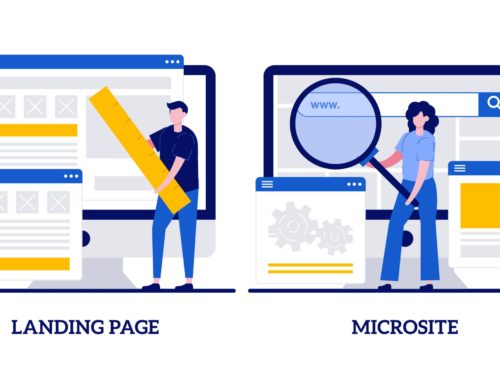What’s the first thing we think about when we decide to run a Marketing Campaign to gain traffic for our websites? Well, hopefully, throwing a couple of Ads and creating a PPC strategy. But running a campaign is not always very easy, and there are usually a lot of things to figure out in order to make your Ads effective (everything from where to place the Ads, which the right design for them would be, which specific product will we promote, among many other aspects) and, even when every little thing seems ready, there’s always something to improve.
We’ve recently discussed whether your business is eligible for a digital marketing strategy (not that it could not be, but this strategy may not always be the right fit for yours) or not. And, later on, we’ve also talked about the many uses those microsites could have, which takes us to today’s matter: How to craft and implement a Microsite that can also help your PPC strategy. So let’s dive in, shall we?
So there’s this concept on Public Relations that goes like “a good public relations strategy is not to talk good about yourself, but to actually get someone else to do it”, so how can we do that in a way that relates to today’s topic? Let’s say you run a website that sells boats, and someone googles “benefits of owning a boat”, and they bump into an Ad you launched saying “boat-owners are the happiest people in the world”, so they click on it and it leads to your website. Leaving aside the clickbaity-ness of the Ad, how do you think it will look if a website that sells boats is the one saying that people who buy boats are happier? Not really trustworthy, is it?
So how about having a neutral, impartial website that actually recommends people to buy your product? Sounds way better, right? And you may wonder how to get a neutral website to spread a positive image about your product… Well, how about creating one? Even when we usually talk about microsites linked to your own website, this doesn’t necessarily have to be the case. You can create a microsite, quick and easy because that’s the big pro they have, that seems completely unrelated to yours, and use it to convince users that you are a trustworthy source (and you know how important brand trust actually is) that actually wants to help them make the right choice. So if they google “benefits of owning a boat” and bump into an Ad saying “boat-owners are the happiest people in the world” that links to an article from a lifestyle magazine, they’ll probably find it much more believable, or at least less biased.
Another great utility a microsite can have is one we’ve talked a lot about recently: the niche specialization subject. So let’s say you run a website dedicated to selling a wide variety of products, launching Ads may be a bit of a challenge because it’s not just promoting one product and targeting a very specific type of person. You have a lot of products and a very diverse audience, so effectiveness can be jeopardized if you don’t really think it through. What if you choose one product, and target its Ad to people that went to your website looking for something else? They won’t care about it, neither will they click on it, and definitely won’t go to your website looking for it. And just like that, you spent a lot of money on a campaign that actually won’t have any success at all.
And this is where niche specialization becomes an incredible asset. You can have as many microsites as you want, and you can specialize in as many products as you want. By creating a microsite that’s specific about just one thing, you reduce the traffic to only people that are actually interested in that one thing. And just like that you have all these people that you know will care about Ads about that specific thing, so your remarketing campaign will be hugely improved just by saying “hey, all of you who are into this, come check it out on a website that’s dedicated to just that one thing”. And even if you don’t have the budget to do it with all your products, you can totally choose the more popular ones and do it with them. Or you can choose the least popular ones and use microsites to promote them. Not to get all philosophical into an everything-is-subjective debate, but definitely, we can say that there must be as many Marketing Campaigns as businesses in the world. Anyhow, this will be a great help when it comes to creating effective Ads and seeing improvements in your CTR numbers.
And the final utility that I came up with was to literally use your microsite as a placement of its own. Basically, you can create a microsite about a subject slightly related to your website’s, for example, to stick to the boat theme, you can create a website that talks about sailing and the ocean. You know that people that are into sailing will, more often than not, also be interested in boats. So why not run this website (which can also be used as an impartial website for the use named above) and have your Ads placed on it? That way, you know that whoever sees it will probably be more likely to click on it than the average internet user.
To conclude, I believe it’s interesting to highlight that Microsite Marketing keeps proving that it has more uses than the ones we may think of at a first glance. It’s a flexible strategy that can be adapted to different businesses, budgets, and users and that appears to have an endless amount of benefits. If you ask me, I’m completely in favor of any Marketing advances that help make our lives easier, and gain more effectiveness when running our campaigns.
It’s true that microsites aren’t exactly an essential asset, but if you have the possibility of trying them out, then I would definitely recommend that you do because it’s a strategy like no other that has a lot to offer. Microsites can improve your whole strategy, and when it comes to PPC these are definitely great examples of how they can easily be crafted and implemented. As for me, I’m headed to create an unbiased website talking about how great Microsites are. So why don’t you go ahead and do the same yourself?






Mora is a PPC Analyst at Hellbent Digital at work, and a theater nerd when not at work. And it turns out understanding theater—that is, how to put on compelling live shows that engage the audience—is a very useful skill for understanding digital marketing.